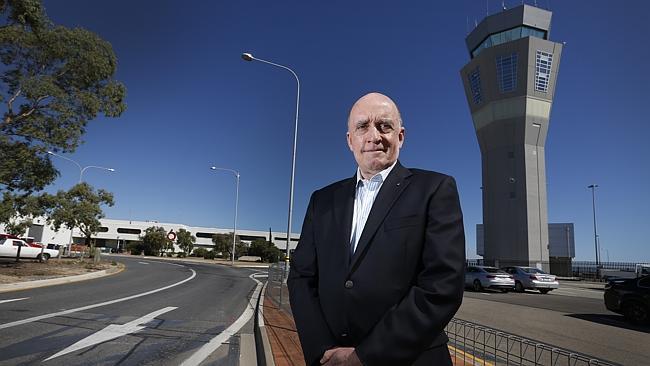Harry Bradford defends ICCPM’s Airservices contract
The pilot dubbed the “Million Dollar Man” by critics denies any conflict of interest in a Airservices contract.

The former RAAF test pilot dubbed the “Million Dollar Man” by Airservices Australia dissidents has hit out at his critics, denying any conflict of interest in a lucrative Airservices contract he secured.
Harry Bradford, the chairman of the International Centre for Complex Project Management, has broken his silence on Airservices’ consultancy arrangements, which a Senate committee hearing suggested appeared to contain conflicts of interest.
The dealings are under investigation by the Australian National Audit Office, which is due to table its report in May.
In an exclusive interview with The Australian, Mr Bradford said senators who made the accusations were wrong, and that he and other consultants in ICCPM had adhered to the highest ethical standards.
The Audit Office late last year launched an investigation into Airservices consultancy contracts awarded to ICCPM for the $1.5 billion OneSKY air traffic control and navigation project, which will integrate military and civilian airspace management by 2021.
The move followed criticism in Senate rural and regional affairs and transport legislation committee hearings of what senators claimed were possible conflicts of interest. The committee heard that Mr Bradford, who was then a director of ICCPM, had received $1 million to act as lead negotiator on Airservices’ behalf in its dealings with Thales, the international aerospace company that has the lead contract for OneSKY.
Senators expressed incredulity that Airservices had hired Mr Bradford to perform this role when the managing director of Thales Australia, Chris Jenkins, was also the chairman of ICCPM, and alleged a possible conflict of interest.
The committee chairman, Liberal Bill Heffernan, said the dealings between Airservices and ICCPM would “not pass the public test … it sounds dodgy”.
“I had one duty to Airservices Australia. I had another duty to the ICCPM board,” Mr Bradford told The Australian. “There was no conflict between those duties.”
Sources within Airservices have told The Australian there is considerable anger within sections of staff over the huge sums paid to consultants, and the fact that so many key figures in the OneSKY project have had connections with ICCPM.
Airservices last month appointed a senior figure in the Department of Defence, Air Vice Marshal Chris Deeble, who was until recently a director and fellow of ICCPM, to head the OneSKY project.
As revealed by The Australian, there is also discontent in Airservices circles over the fact that some executives made trips to the Paris headquarters of Thales, when Thales has a large operation with more than 3000 employees in Australia to service clients locally.
Asked about his $1m consultancy fee, which covered a period of about 18 months, Mr Bradford said: “I don’t worry about these issues — I set my fees and if people want to engage me they can, and if they don’t want to, they don’t.”
The Senate committee also heard that ICCPM managing director Deborah Hein is the wife of Steve Hein, who worked for ICCPM until hired by Airservices in a senior managerial role. One contract Airservices struck with ICCPM was processed by Mr Hein.
Mr Bradford said all those involved in ICCPM had upheld the highest propriety and denied there had been any conflict of interest in any of its contracts with Airservices, which have been completed.
Mr Bradford had a distinguished air force career, including flying 270 combat missions as a bomber pilot in Vietnam, and as an instructor and test pilot, and was awarded the Air Force Cross.
He was for a period a colleague of then fellow RAAF officer Angus Houston, now the chairman of Airservices.
After leaving the RAAF Mr Bradford worked in a variety of senior management roles in aerospace, including for Hawker de Havilland, British Aerospace and BAE Systems Australia. He was one of the founders of ICCPM when it was established in 2007.
Mr Bradford said ICCPM was initially set up with the support of military organisations and aerospace groups including the Department of Defence, BAE Systems and Thales, as an “altruistic” non-profit organisation to help address problems which could lead major complex projects to go wrong.
Mr Bradford said reasons big projects went astray included cases where “requirements are not well established and stable, there is an underappreciation of technical risk, and underappreciation of the criticality of a high-performing team and all the human factors that go with that”.
“The thing that goes wrong more than anything else is putting the wrong people in the key positions,” he said.
Mr Bradford said while ICCPM was designed to extend knowledge about project management, it quickly became apparent that to fund itself, it would have to do consultancy work.




To join the conversation, please log in. Don't have an account? Register
Join the conversation, you are commenting as Logout